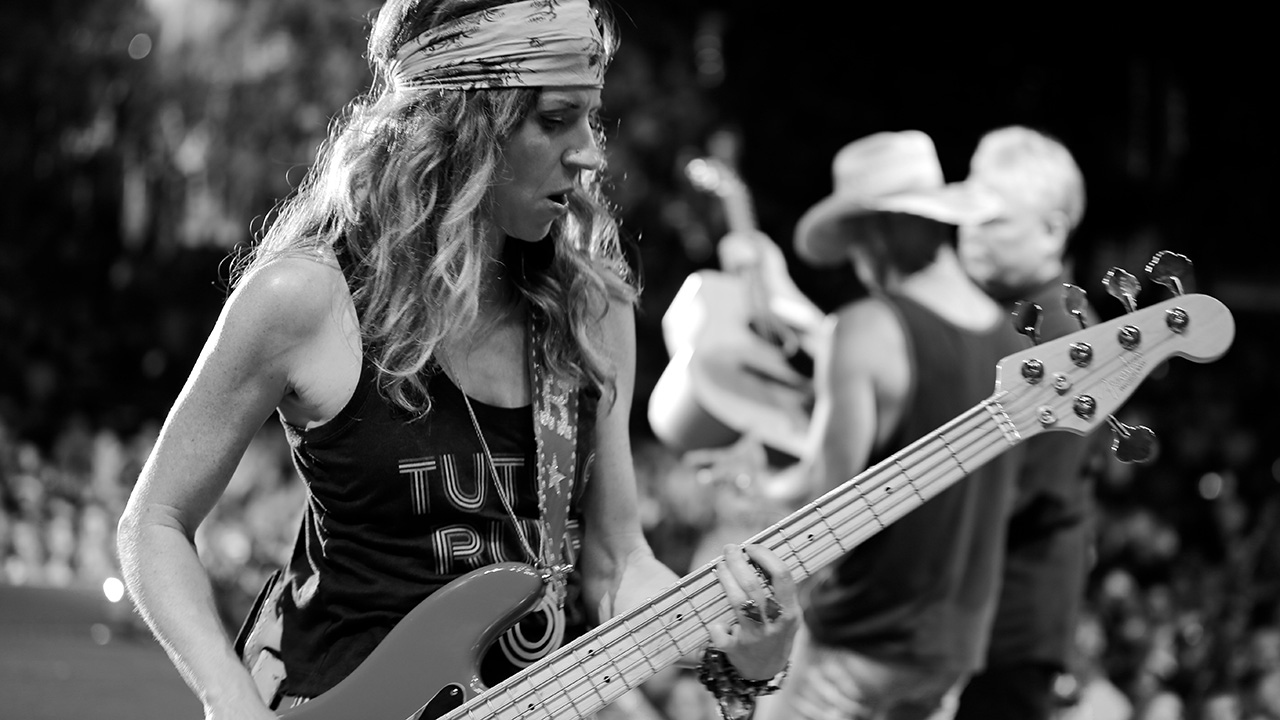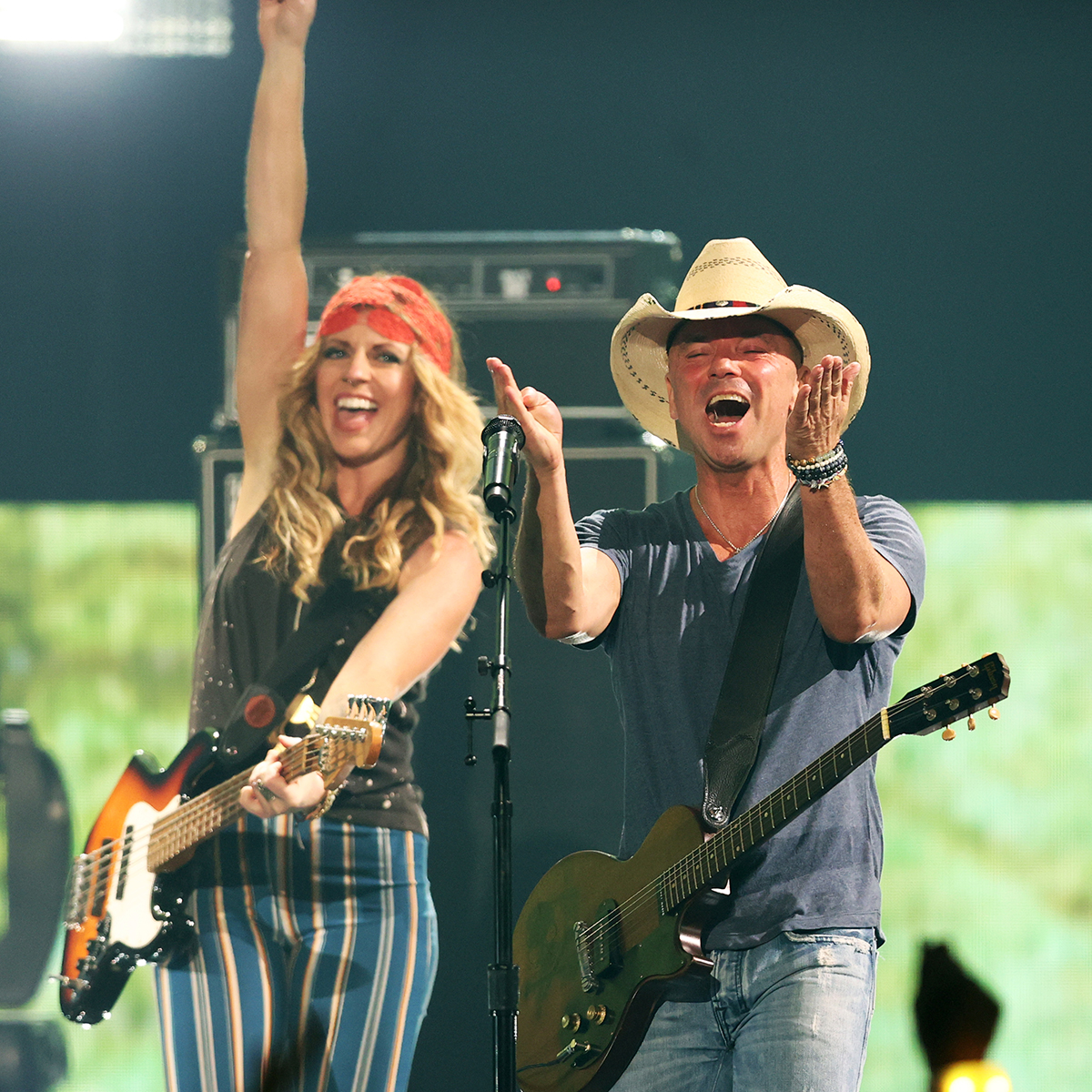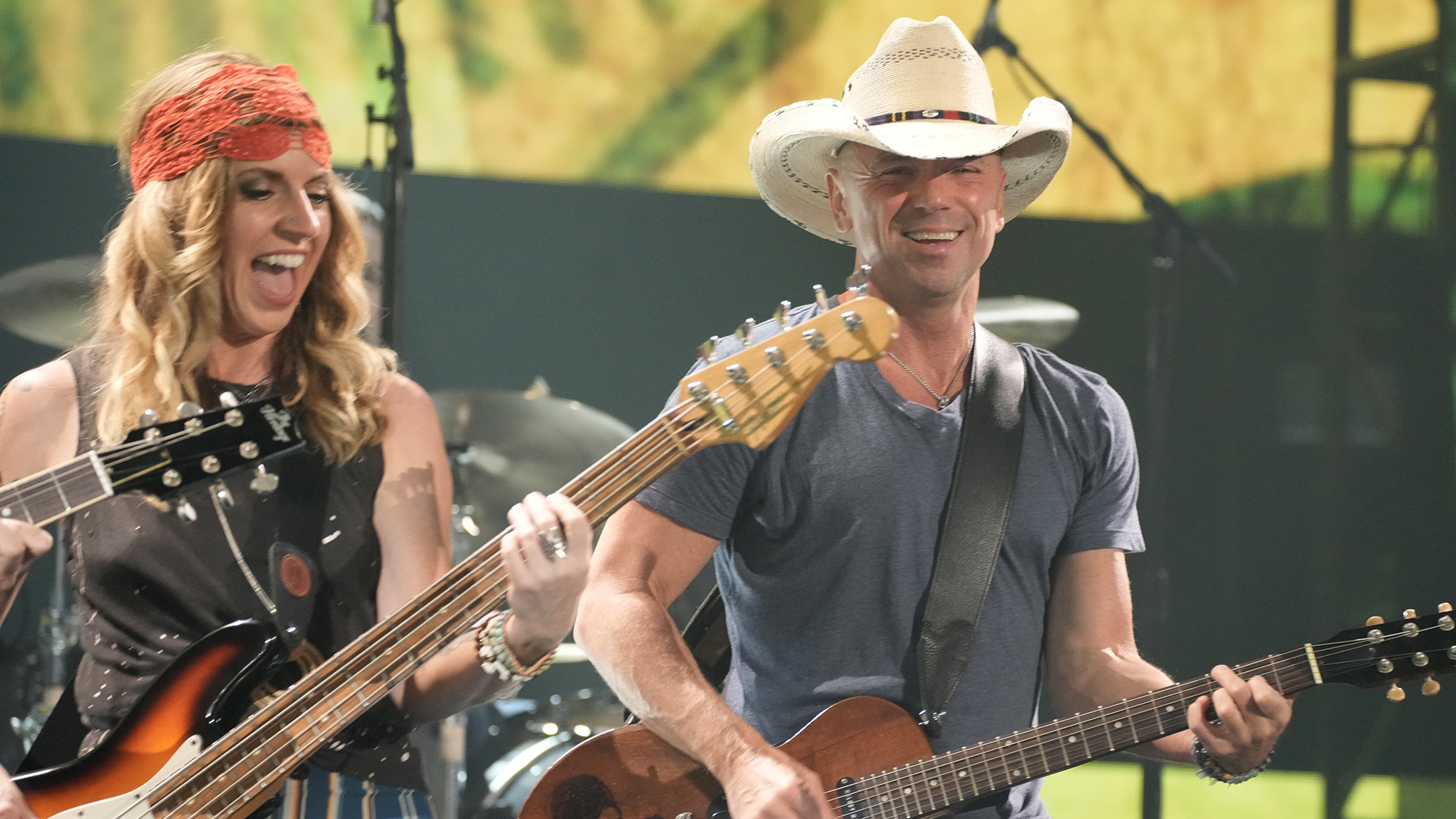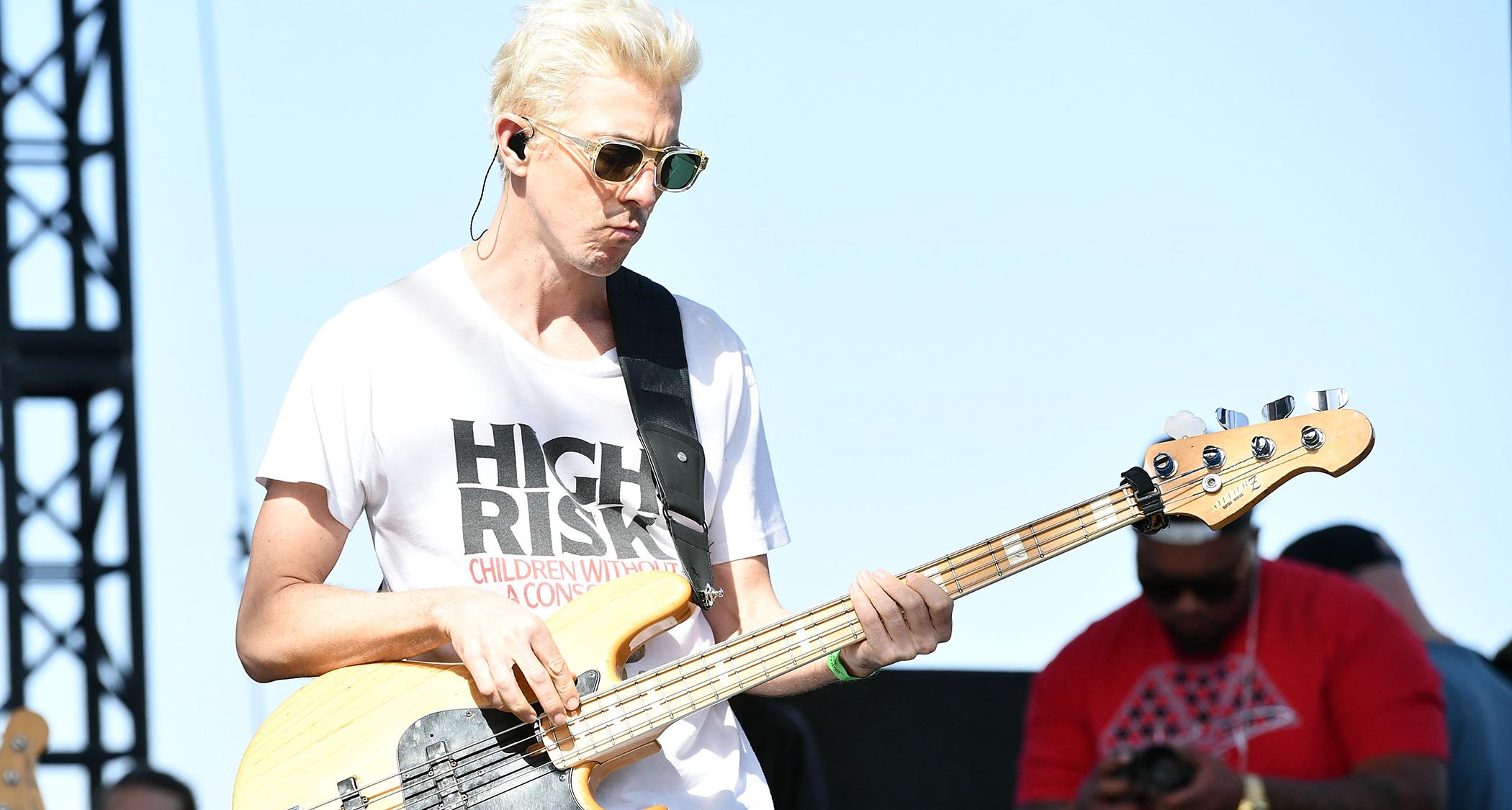“Nobody said, ‘You need to play five-string,’ but for stadium gigs there’s nothing cooler than hitting a low B and feeling it in your core”: Kenny Chesney bassist Harmoni Kelley on why five-strings rule for modern country players
With no experience of the extra string until her successful audition with Chesney, Kelley’s taken her P Bass attitude and hard rock roots for longterm stroll down Music Row

All the latest guitar news, interviews, lessons, reviews, deals and more, direct to your inbox!
You are now subscribed
Your newsletter sign-up was successful
As a teenager, Harmoni Kelley’s vision of being a career musician was more hard rock than Music Row. Growing up in Austin, Texas, her father’s record collection included The Beatles, The Band, Little Feat and Motown — rhythm-heavy, groove-oriented tracks that immediately drew her toward the bass.
As an adolescent, her tastes moved toward Metallica and Guns N’ Roses. At 17, inspired by Duff McKagan, she began teaching herself to play. As her skills expanded, so did opportunities, and soon she was gigging professionally in Austin’s thriving scene.
“I came from the club world, up through the ranks with my friends and peers,” Kelley says. “I have a soft spot in my heart for Austin because it taught me everything I knew about being in a band.
“It was club dates, crappy monitor wedges with not-great sound, packing up all your stuff, throwing it in the back of the van, driving to Dallas to play a show, packing everything up and driving home at 2am. That’s how I cut my teeth.”
She relocated to Nashville and was working in songwriting circles when she got the call to audition for Kenny Chesney in the fall of 2014. She showed up with a rented five-string bass, was provided a pair of generic in-ears, and was hired.
She began 2015 on tour as a member of Chesney’s band, which now includes guitarists Danny Rader, Jon Conley and Kenny Greenberg, drummer Nick Buda, and keyboardist Wyatt Beard.
Almost a decade later, Kelley is a two-time Country Music Association nominee for Touring Musician of the Year. In January she was a featured participant at the NAMM Show Live Sound Panel alongside Chesney’s front-of-house engineer Robert Scovill and monitor engineer Phill Robinson.
All the latest guitar news, interviews, lessons, reviews, deals and more, direct to your inbox!
What have you learned about yourself over the course of 10 years with Kenny Chesney?
“A ton! I’m definitely more confident. I was the bass player that stood back by the drummer and sang occasionally on some songs. I certainly wasn’t showy or flashy. I didn’t move around a lot. I was like, ‘I’m here to support. I’m going to lay a great bed for everybody to play on; I’m going to play for the song and with the drummer, and I’m going to lock in.’
“I still do all those things, but now I also run around on this huge stage and out onto the T-shaped thrust that goes 60 feet into the crowd.

“So many things about this gig have been transformative for me as a player and a person. Being able to step into the part with confidence and think, ‘I can do that and I’m really good at it’ is not something I would have said about myself before, because I didn't come from that world.
“When I got the gig, people said, ‘You have no idea what an amazing goldmine you’ve stepped into’ – not from a financial perspective, necessarily, but from a family perspective: just having a boss like Kenny, the road family and the camp that we have. It’s unlike anybody else.”
You came into the gig with an Ampeg SVT. What’s in your rig now?
“When I started with Kenny, I stood just left of the drummer and I had the SVT 810 cabinet underneath the stage. Our stage is like a metal grate with different levels. The 810 was in a sled that my awesome bass tech, Terry Fox, had made. That’s where my vocal mic was; so when I stood there I felt the bass coming up at me.
“We’ve since moved my stage position quite a bit. I spend more time downstage because the band is moving during the entire show. We’re playing off each other and with the camera guys – it’s a full show.
“We got rid of the 810, and for this tour, Robert Scovill is building a custom ISO cab with three Ampeg SVT tube DIs that are really hard to find because Ampeg stopped making them a long time ago. I haven’t seen it in person yet – only a picture that Robert sent me – so I can’t say exactly what the setup’s going to be, but I’m very excited about it.”
Which basses are you bringing?
“I only play five-string with Kenny. I have a great relationship with Fender and I’m so lucky that they send me stuff every year or two to try out. I still use the P Bass, the American Professional. They sent me a newer version last year, which I’m going to use this year as well.
“I usually bring two basses on tour: one that I play and one as a backup, both with D’Addario NYXL roundwounds, and both loaded with Seymour Duncan Quarter Pounds. I love those pickups because they add a little bit of gritty punch and they help the bass cut through.”
What’s on your pedalboard?
The bass has such an overwhelming sound, and so it kind of dominates everyone’s ear… you can’t get lost or miss a part
“Within the last handful of years, I’ve started introducing a couple of pedals because I want a little more growl and distortion on particular songs. Last year I started using the Ampeg SGT-DI. That’s been my go-to ever since Ampeg sent it to me.
“I have a Tech 21 Dug Pinnick bass pedal. We tried a bunch of different things, trying to find a crunch-distortion-overdrive sound that wouldn’t lose the low end – that's the trickiest thing. We landed on the Tech 21 last year.
“I also use an Ampeg Liquifier, their version of a warbly chorus pedal, on one chorus of the song Summertime. There’s a cool signature bass riff that happens, and I use it on that one moment because I felt it needed that.”
You’ve said: “The bass player can’t make a mistake. You’re there from the moment the song starts.”
“Of course I’m human and I do make mistakes! So it’s more of a general statement. Musicians who aren’t bass players often tell me, ‘You have the hardest job. There’s the most pressure on you.’ The bass has such an overwhelming sound, and so it kind of dominates everyone’s ear, especially when you’re playing a stadium.
“If I make a mistake, drop out, break a string and have to switch out a bass real quick, or something else happens, I feel it’s much more noticeable. As a bass player you can’t get lost or miss a part.”

You auditioned on a five-string while having no five-string experience. Now it’s your only bass on tour.
“I still struggle with it sometimes. When I got the audition, nobody came to me and said, ‘You need to play five-string.’ In fact, it was never mentioned. But I knew what I was hearing when they sent me the six songs for the audition, and I knew that the lower B string was there in at least four out of those six.
“Almost every bass player I knew in Nashville at the time was playing a five-string. It’s more prevalent in modern country and gospel, obviously, because the modern sound has a pop sensibility to it and also dips into hip-hop. Maybe all of that, mixed with country, is what brought the five-string into play.
“And there’s something really cool, as a bass player, to go even lower. Especially for stadium gigs – man, there is nothing cooler than hitting a low B string and feeling it in your core! I never experienced that until I started playing with Kenny, and now I really dig it.”
How do you keep your chops up between touring cycles?
I’m in a couple of cover bands, which allows me to stretch in new ways and learn different bass parts
“Typically, Kenny gets off the road at the end of August, and from September to January, I play gigs in Austin. I can’t not play; it’s wired into my DNA. It’s really hard to say no to playing music, especially with people you love and music that’s really fun. It keeps me engaged, and I like playing different things when I’m not on the road. It’s also good for my hands and my ears.
“In Austin I play R&B and soul gigs. I’m in a couple of cover bands, which allows me to stretch in new ways and learn different bass parts. For those gigs, I use a Fender four-string P Bass with La Bella flatwounds.
“I come back to this rock ’n’ roll / country world with those hometown R&B and Americana sensibilities, and it probably does change my playing a bit and keeps me fresh in those off months.”
You describe yourself as a “meat and potatoes” bass player. What does that mean to you?
A lot of bass players, it’s almost like they’re competing with the guitars and keys and vocals
“I like to play for the song and I don’t play a lot. I feel like there’s magic in what you choose to play, the way you approach playing a note – and also what you don’t play and the times you choose to lay out.
“I’ve always been more ‘plug the bass into an amp and play.’ I’ve shied away from wanting to play all the notes, because a lot of bass players, it’s almost like they’re competing with the guitars and keys and vocals.
“I’m playing with everyone. I’m not playing above anybody, and I don’t want to show off, like, ‘Look at all the notes I can play.’ The song is about what that person is singing, what that person has written – and as musicians, we’re here in a supportive role to that.”
- Keep up to date via Harmony Kelley’s site and catch her on tour with Kenny Chesney throughout summer 2024.
Alison Richter is a seasoned journalist who interviews musicians, producers, engineers, and other industry professionals, and covers mental health issues for GuitarWorld.com. Writing credits include a wide range of publications, including GuitarWorld.com, MusicRadar.com, Bass Player, TNAG Connoisseur, Reverb, Music Industry News, Acoustic, Drummer, Guitar.com, Gearphoria, She Shreds, Guitar Girl, and Collectible Guitar.






